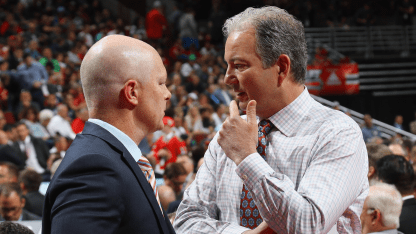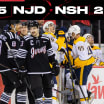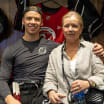\This is a three-part series intended to shine a light on what happens behind closed doors as the New Jersey Devils prepare to make their selections at the 2018 NHL Draft in Dallas on June 22nd and 23rd. The first installment highlights the importance of the player information department.**
Last summer, Devils general manager Ray Shero assessed the hockey operations department for potential areas of improvement and decided to hire Scott Harris as the manager of player information and video.
Devils leaving no stone unturned ahead of 2018 NHL Draft
General Manager Ray Shero has built the Devils most expansive player research team ahead of 2018 NHL Draft in Dallas.

By
Julie Robenhymer @JulieRobenhymer / newjerseydevils.com
"Every team is trying to get an edge and we're no different. You can't just do things because that's the way they've always been done and expect to get better. You need to try to find new and better ways to do things and this is one of those things," Shero explained.
Having first met Harris during the 2014 Winter Olympics while Shero was part of USA Hockey's executive advisory committee and Harris was working with the coaching staff as a video analyst, he thought the information Harris was providing was really good information to have and was impressed with his work.
"I had the chance to meet him a couple times since then and, last year, I just thought there was more we could be doing to point ourselves in the direction we wanted to be going and I felt Scott could help us get there by building out a database of information and compiling everything from analytics, video, scouting and just coordinating all the information we wanted to have on a player in one spot," Shero continued. "I just knew there was a better way than the way we were doing it and I knew that Scott could help us."
Soon after Harris was hired, Kate Madigan was added to the staff to help compile and organize the abundance of information they intended to gather with over 700 players in the NHL, another 700 in the AHL, plus players in the ECHL, Europe, junior and college draftees and UFAs, not to mention the new crop of draft eligible players.
"The whole objective is to make sure that when we go to the draft, free agency, trade deadline or even evaluating our own players and prospects that we have every relevant piece of information as possible so that the decision makers are better equipped to make that decision than the next team by giving them every available piece of information on each player," Harris said. "In terms of the draft, the first half of the season is about the scouts recognizing and prioritizing players. The second half of the season, we really focus on the guys that have piqued our scouts' interest and gather any and all pieces of information, whether we get it directly from the player through questionnaires or the interviews our scouts do with them or indirectly from Central Scouting or through different articles in the media. It all goes into that player's profile in our database."
Madigan added: "There are hard copies - what I call the Holy Grail - that each scout and member of management get at our scouting meetings to have a summary of all the information we have about a player easily accessible on one page, but we also have an online version that's more detailed with every scouting report that's been filed on a player, plus video of some of their shifts and even links to stories on them that we've found online whether it be a feature where we learn more about their background or maybe they had a noteworthy game. It's just all right there at their fingertips and easily accessible."
Dan MacKinnon, Devils senior director of player personnel, said it's the most information he's ever had going into a draft and he's been working in management for 18 seasons.
"Even when we're in our meetings and we say things like, 'I wonder about this…' they go out and get that information and add it to that player's profile without us even asking for it," he said. "Scott and Kate have done a great job doing the leg work and getting that information for us, which allows us to focus on other things. When Ray created this department, the whole point was not to leave any stone unturned and they are definitely checking under every single rock."
The challenge is to sift through all the information that's out there and find what's valuable to management so they can determine which players will fit into the culture and identity of being a New Jersey Devil.
"Since Ray took over in New Jersey, the entire management and scouting staff along with our coaches have really done a good job of mapping out the DNA of a Devils player and the qualities and characteristics we want every player to have both on and off the ice and, with every player we evaluate, we hold that lens over them to see how well they fit into our criteria," MacKinnon explained. "It's no secret that we value speed and compete and skating and skill and we drill deeper in each of those boxes to see how well they fill out that box, but if you're going to play for Ray Shero and John Hynes with the New Jersey Devils you have to be able to skate and have the mindset that you're going to win the 50/50 puck battles and then have the hockey sense to turn a play and read what's going on around you and adjust and then have the skill to do something with that. As John Hynes likes to say, 'Hockey is controlled chaos and you need to be able to make something out of nothing.'"
While it'd be impossible to check all the boxes 100 percent, Devils management wants players that have something to offer in every area they've identified as valuable to the organization.
"The only thing we don't want is someone to be elite in one or two areas, but then have an absence in one or two of the other areas that we value," MacKinnon continued. "It doesn't matter how talented they are in other areas because at some point, that player just won't fit into what we're trying to do and in a salary cap world, you can't afford to make those mistakes."
That's why having every piece of information available and being able to make better use of the 15 minutes they get to meet with each prospect during their interviews at the combine is so important.
"Those 15 minutes become more valuable when you've already done your homework and don't have to ask the generic questions and can dig a little deeper in certain areas and really get to know a player," Harris said. "Once we draft them, all the information we've collected is passed along to our development coaches so they can do everything they can to help them become a New Jersey Devil and even for the players that we don't draft, this information sits on the shelf and we continue to add to it in case he becomes available again at some point either though a trade or as a free agent some day."
The more a team knows about a player, the better prepared management is to make a decision on them and the better prepared the development and training and coaching staffs are to help that player get better.
"I knew this department could help us, but it's been a lot better than I even thought it would be this first year," Shero said. "They've done a great job gathering all this information and having it at our fingertips and it goes so far beyond just the draft. It's trade analysis and potential free agents and working with our coaching staff for pre- and post-game video. It's been incredibly productive and beneficial for us and there's so much more we can do moving forward. It's really exciting to think about what's next, but in the short term, we're really excited about how this information will help us make better decisions at the draft table for our organization. We're looking for really good players, but we're also looking for really good people."
\The next installment will take you inside the Devils interview suite at the NHL Scouting Combine in Buffalo last week.**


















